
UFO
A UI-Focused Agent for Windows OS Interaction.
Stars: 6592
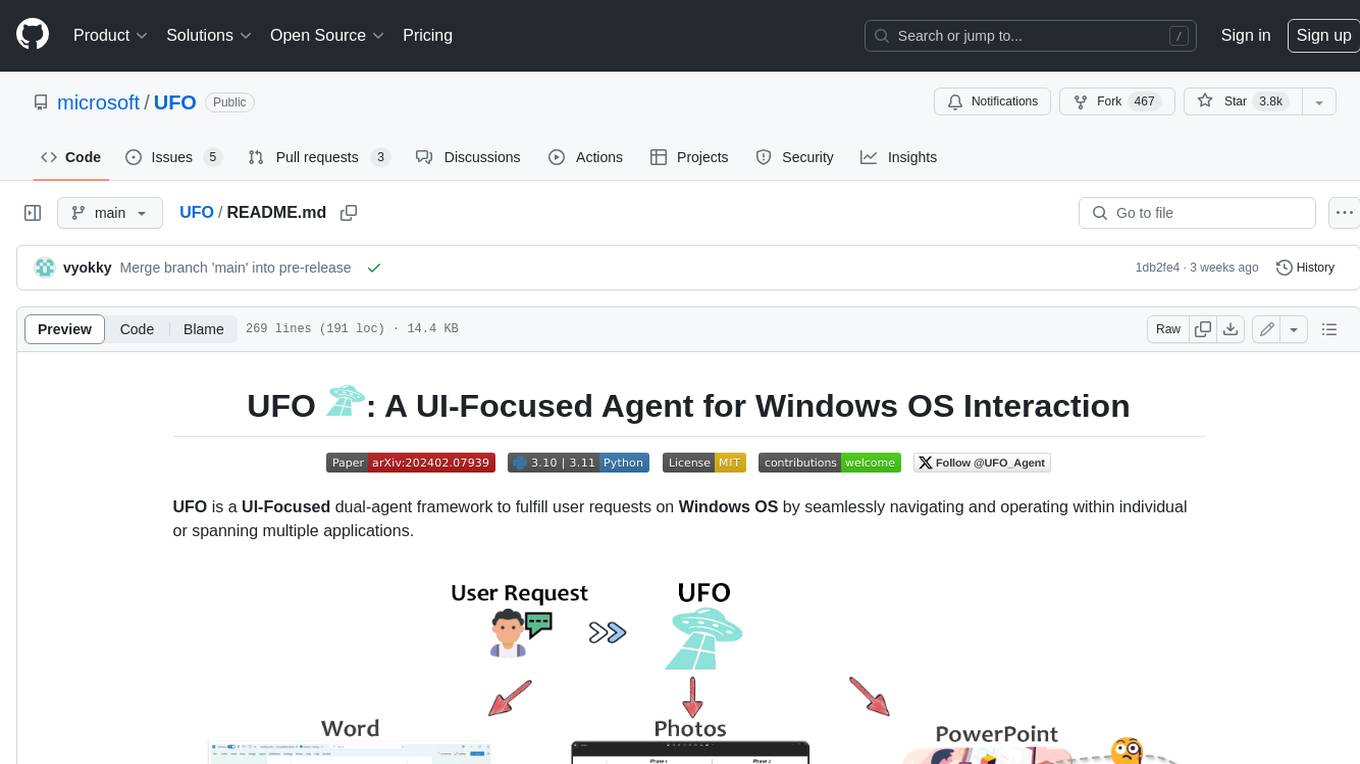
UFO is a UI-focused dual-agent framework to fulfill user requests on Windows OS by seamlessly navigating and operating within individual or spanning multiple applications.
README:
UFO is a UI-Focused multi-agent framework to fulfill user requests on Windows OS by seamlessly navigating and operating within individual or spanning multiple applications.
UFO ![]() operates as a multi-agent framework, encompassing:
operates as a multi-agent framework, encompassing:
- HostAgent 🤖, tasked with choosing an application for fulfilling user requests. This agent may also switch to a different application when a request spans multiple applications, and the task is partially completed in the preceding application.
- AppAgent 👾, responsible for iteratively executing actions on the selected applications until the task is successfully concluded within a specific application.
- Application Automator 🎮, is tasked with translating actions from HostAgent and AppAgent into interactions with the application and through UI controls, native APIs or AI tools. Check out more details here.
Both agents leverage the multi-modal capabilities of GPT-4V(o) to comprehend the application UI and fulfill the user's request. For more details, please consult our technical report and documentation.
- 📅 2025-01-21: Version v1.2.1 Released! We’re excited to announce the release of v1.2.1! 🎉 This update includes:
-
Bug Fixes: Resolved issues in
requirements.txtfor smoother setup. -
Multi-Action Mode: Introducing a powerful new feature to execute multiple actions in a single inference step! Enable this mode by setting
ACTION_SEQUENCE=Trueinconfig_dev.yamland enjoy a more efficient workflow.
-
Bug Fixes: Resolved issues in
- 📅 2024-12-13: We have a New Release for v1.2.0!! Checkout our new features and improvements:
- Large Action Model (LAM) Data Collection: We have released the code and sample data for Large Action Model (LAM) data collection with UFO! Please checkout our new paper, code and documentation for more details.
- Bash Command Support: HostAgent also support bash command now!
- Bug Fixes: We have fixed some bugs, error handling, and improved the overall performance.
- 📅 2024-09-08: We have a New Release for v1.1.0!, to allows UFO to click on any region of the application and reduces its latency by up tp 1/3!
- 📅 2024-07-06: We have a New Release for v1.0.0!. You can check out our documentation. We welcome your contributions and feedback!
- 📅 2024-06-28: We are thrilled to announce that our official introduction video is now available on YouTube!
- 📅 ...
- 📅 2024-02-14: Our technical report is online!
- 📅 2024-02-10: UFO is released on GitHub🎈. Happy Chinese New year🐉!
UFO sightings have garnered attention from various media outlets, including:
- Microsoft's UFO abducts traditional user interfaces for a smarter Windows experience
- 🚀 UFO & GPT-4-V: Sit back and relax, mientras GPT lo hace todo🌌
- The AI PC - The Future of Computers? - Microsoft UFO
- 下一代Windows系统曝光:基于GPT-4V,Agent跨应用调度,代号UFO
- 下一代智能版 Windows 要来了?微软推出首个 Windows Agent,命名为 UFO!
- Microsoft発のオープンソース版「UFO」登場! Windowsを自動操縦するAIエージェントを試す
- ...
These sources provide insights into the evolving landscape of technology and the implications of UFO phenomena on various platforms.
- [x] First Windows Agent - UFO is the pioneering agent framework capable of translating user requests in natural language into actionable operations on Windows OS.
- [x] Agent as an Expert - UFO is enhanced by Retrieval Augmented Generation (RAG) from heterogeneous sources, including offline help documents, online search engines, and human demonstrations, making the agent an application "expert".
- [x] Rich Skill Set - UFO is equipped with a diverse set of skills to support comprehensive automation, such as mouse, keyboard, native API, and "Copilot".
- [x] Interactive Mode - UFO facilitates multiple sub-requests from users within the same session, enabling the seamless completion of complex tasks.
- [x] Agent Customization - UFO allows users to customize their own agents by providing additional information. The agent will proactively query users for details when necessary to better tailor its behavior.
- [x] Scalable AppAgent Creation - UFO offers extensibility, allowing users and app developers to create their own AppAgents in an easy and scalable way.
UFO requires Python >= 3.10 running on Windows OS >= 10. It can be installed by running the following command:
# [optional to create conda environment]
# conda create -n ufo python=3.10
# conda activate ufo
# clone the repository
git clone https://github.com/microsoft/UFO.git
cd UFO
# install the requirements
pip install -r requirements.txt
# If you want to use the Qwen as your LLMs, uncomment the related libs.Before running UFO, you need to provide your LLM configurations individually for HostAgent and AppAgent. You can create your own config file ufo/config/config.yaml, by copying the ufo/config/config.yaml.template and editing config for HOST_AGENT and APP_AGENT as follows:
VISUAL_MODE: True, # Whether to use the visual mode
API_TYPE: "openai" , # The API type, "openai" for the OpenAI API.
API_BASE: "https://api.openai.com/v1/chat/completions", # The the OpenAI API endpoint.
API_KEY: "sk-", # The OpenAI API key, begin with sk-
API_VERSION: "2024-02-15-preview", # "2024-02-15-preview" by default
API_MODEL: "gpt-4-vision-preview", # The only OpenAI modelVISUAL_MODE: True, # Whether to use the visual mode
API_TYPE: "aoai" , # The API type, "aoai" for the Azure OpenAI.
API_BASE: "YOUR_ENDPOINT", # The AOAI API address. Format: https://{your-resource-name}.openai.azure.com
API_KEY: "YOUR_KEY", # The aoai API key
API_VERSION: "2024-02-15-preview", # "2024-02-15-preview" by default
API_MODEL: "gpt-4-vision-preview", # The only OpenAI model
API_DEPLOYMENT_ID: "YOUR_AOAI_DEPLOYMENT", # The deployment id for the AOAI APIYou can also non-visial model (e.g., GPT-4) for each agent, by setting VISUAL_MODE: False and proper API_MODEL (openai) and API_DEPLOYMENT_ID (aoai). You can also optionally set an backup LLM engine in the field of BACKUP_AGENT if the above engines failed during the inference.
You can utilize non-visual models (e.g., GPT-4) for each agent by configuring the following settings in the config.yaml file:
VISUAL_MODE: False # To enable non-visual mode.- Specify the appropriate
API_MODEL(OpenAI) andAPI_DEPLOYMENT_ID(AOAI) for each agent.
Optionally, you can set a backup language model (LLM) engine in the BACKUP_AGENT field to handle cases where the primary engines fail during inference. Ensure you configure these settings accurately to leverage non-visual models effectively.
UFO also supports other LLMs and advanced configurations, such as customize your own model, please check the documents for more details. Because of the limitations of model input, a lite version of the prompt is provided to allow users to experience it, which is configured in config_dev.yaml.
If you want to enhance UFO's ability with external knowledge, you can optionally configure it with an external database for retrieval augmented generation (RAG) in the ufo/config/config.yaml file.
We provide the following options for RAG to enhance UFO's capabilities:
- Offline Help Document Enable UFO to retrieve information from offline help documents.
- Online Bing Search Engine: Enhance UFO's capabilities by utilizing the most up-to-date online search results.
- Self-Experience: Save task completion trajectories into UFO's memory for future reference.
- User-Demonstration: Boost UFO's capabilities through user demonstration.
Consult their respective documentation for more information on how to configure these settings.
# assume you are in the cloned UFO folder
python -m ufo --task <your_task_name>This will start the UFO process and you can interact with it through the command line interface. If everything goes well, you will see the following message:
Welcome to use UFO🛸, A UI-focused Agent for Windows OS Interaction.
_ _ _____ ___
| | | || ___| / _ \
| | | || |_ | | | |
| |_| || _| | |_| |
\___/ |_| \___/
Please enter your request to be completed🛸:- Before UFO executing your request, please make sure the targeted applications are active on the system.
- The GPT-V accepts screenshots of your desktop and application GUI as input. Please ensure that no sensitive or confidential information is visible or captured during the execution process. For further information, refer to DISCLAIMER.md.
You can find the screenshots taken and request & response logs in the following folder:
./ufo/logs/<your_task_name>/
You may use them to debug, replay, or analyze the agent output.
- Please first check our our documentation here.
- ❔GitHub Issues (prefered)
- For other communications, please contact [email protected].
Please consult the WindowsBench provided in Section A of the Appendix within our technical report. Here are some tips (and requirements) to aid in completing your request:
- Prior to UFO execution of your request, ensure that the targeted application is active (though it may be minimized).
- Please note that the output of GPT-V may not consistently align with the same request. If unsuccessful with your initial attempt, consider trying again.
Our technical report paper can be found here. Note that previous AppAgent and ActAgent in the paper are renamed to HostAgent and AppAgent in the code base to better reflect their functions. If you use UFO in your research, please cite our paper:
@article{ufo,
title={{UFO: A UI-Focused Agent for Windows OS Interaction}},
author={Zhang, Chaoyun and Li, Liqun and He, Shilin and Zhang, Xu and Qiao, Bo and Qin, Si and Ma, Minghua and Kang, Yu and Lin, Qingwei and Rajmohan, Saravan and Zhang, Dongmei and Zhang, Qi},
journal={arXiv preprint arXiv:2402.07939},
year={2024}
}
- [x] RAG enhanced UFO.
- [x] Support more control using Win32 API.
- [x] Documentation.
- [ ] Support local host GUI interaction model.
- [ ] Chatbox GUI for UFO.
-
If you're interested in data analytics agent frameworks, check out TaskWeaver, a code-first LLM agent framework designed for seamlessly planning and executing data analytics tasks.
-
For more information on GUI agents, refer to our survey paper: Large Language Model-Brained GUI Agents: A Survey. You can also explore the survey through:
By choosing to run the provided code, you acknowledge and agree to the following terms and conditions regarding the functionality and data handling practices in DISCLAIMER.md
This project may contain trademarks or logos for projects, products, or services. Authorized use of Microsoft trademarks or logos is subject to and must follow Microsoft's Trademark & Brand Guidelines. Use of Microsoft trademarks or logos in modified versions of this project must not cause confusion or imply Microsoft sponsorship. Any use of third-party trademarks or logos are subject to those third-party's policies.
For Tasks:
Click tags to check more tools for each tasksFor Jobs:
Alternative AI tools for UFO
Similar Open Source Tools

UFO
UFO is a UI-focused dual-agent framework to fulfill user requests on Windows OS by seamlessly navigating and operating within individual or spanning multiple applications.

OpenAdapt
OpenAdapt is an open-source software adapter between Large Multimodal Models (LMMs) and traditional desktop and web Graphical User Interfaces (GUIs). It aims to automate repetitive GUI workflows by leveraging the power of LMMs. OpenAdapt records user input and screenshots, converts them into tokenized format, and generates synthetic input via transformer model completions. It also analyzes recordings to generate task trees and replay synthetic input to complete tasks. OpenAdapt is model agnostic and generates prompts automatically by learning from human demonstration, ensuring that agents are grounded in existing processes and mitigating hallucinations. It works with all types of desktop GUIs, including virtualized and web, and is open source under the MIT license.
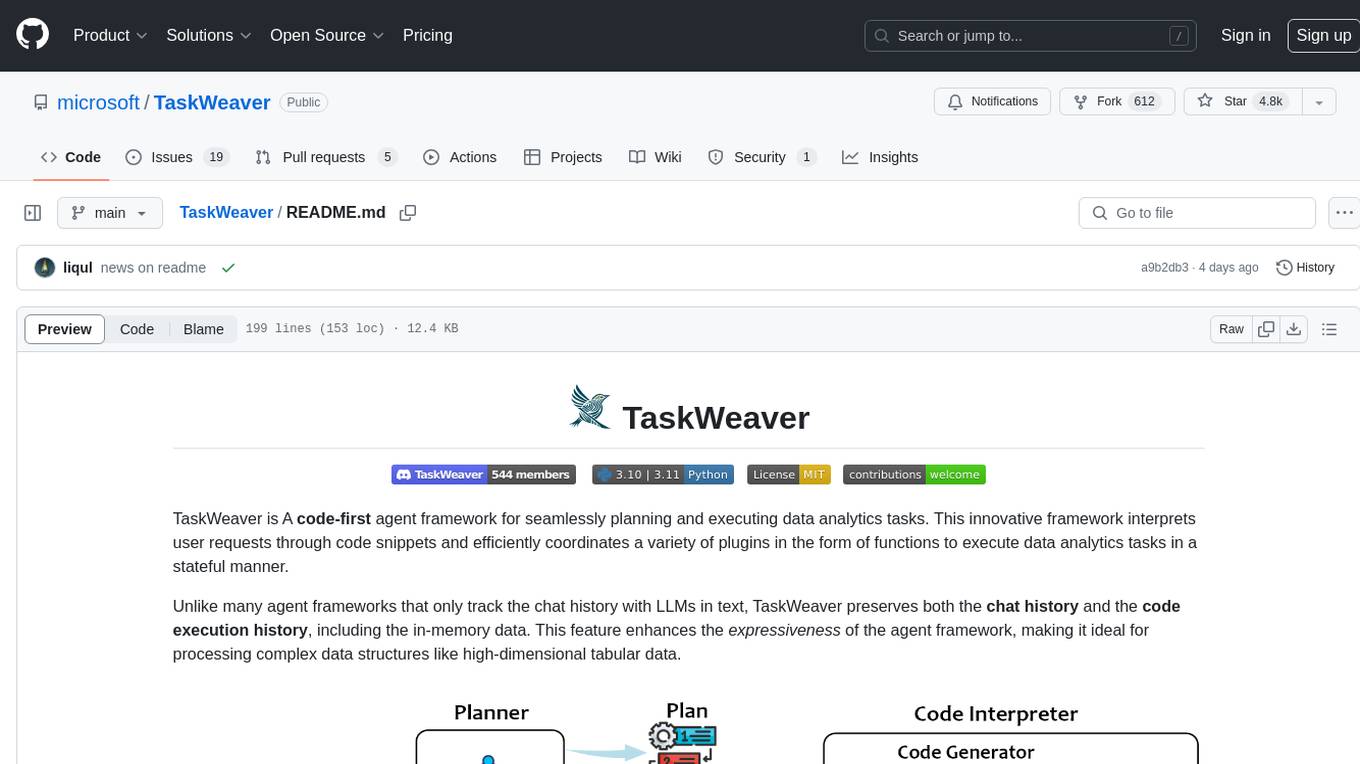
TaskWeaver
TaskWeaver is a code-first agent framework designed for planning and executing data analytics tasks. It interprets user requests through code snippets, coordinates various plugins to execute tasks in a stateful manner, and preserves both chat history and code execution history. It supports rich data structures, customized algorithms, domain-specific knowledge incorporation, stateful execution, code verification, easy debugging, security considerations, and easy extension. TaskWeaver is easy to use with CLI and WebUI support, and it can be integrated as a library. It offers detailed documentation, demo examples, and citation guidelines.

llm-answer-engine
This repository contains the code and instructions needed to build a sophisticated answer engine that leverages the capabilities of Groq, Mistral AI's Mixtral, Langchain.JS, Brave Search, Serper API, and OpenAI. Designed to efficiently return sources, answers, images, videos, and follow-up questions based on user queries, this project is an ideal starting point for developers interested in natural language processing and search technologies.

MetaGPT
MetaGPT is a multi-agent framework that enables GPT to work in a software company, collaborating to tackle more complex tasks. It assigns different roles to GPTs to form a collaborative entity for complex tasks. MetaGPT takes a one-line requirement as input and outputs user stories, competitive analysis, requirements, data structures, APIs, documents, etc. Internally, MetaGPT includes product managers, architects, project managers, and engineers. It provides the entire process of a software company along with carefully orchestrated SOPs. MetaGPT's core philosophy is "Code = SOP(Team)", materializing SOP and applying it to teams composed of LLMs.

deep-research
Deep Research is a lightning-fast tool that uses powerful AI models to generate comprehensive research reports in just a few minutes. It leverages advanced 'Thinking' and 'Task' models, combined with an internet connection, to provide fast and insightful analysis on various topics. The tool ensures privacy by processing and storing all data locally. It supports multi-platform deployment, offers support for various large language models, web search functionality, knowledge graph generation, research history preservation, local and server API support, PWA technology, multi-key payload support, multi-language support, and is built with modern technologies like Next.js and Shadcn UI. Deep Research is open-source under the MIT License.
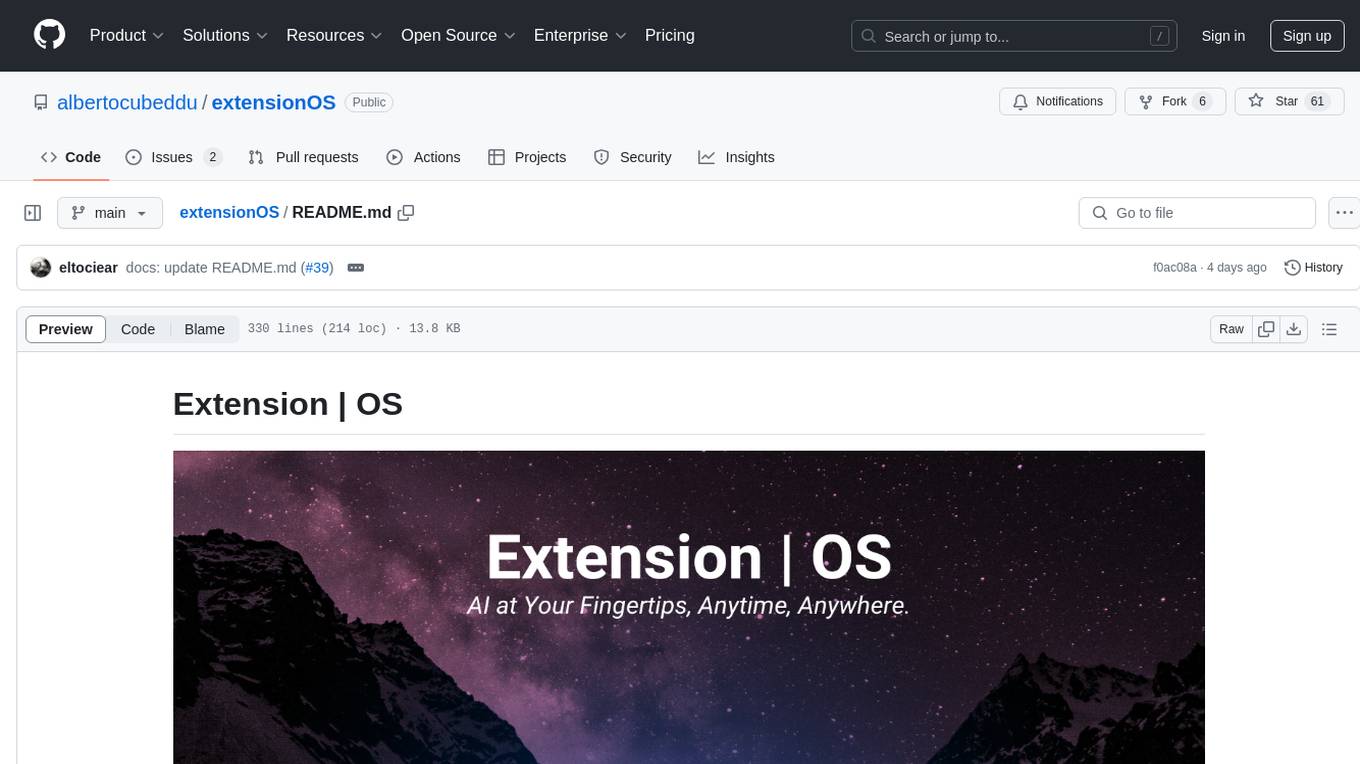
extensionOS
Extension | OS is an open-source browser extension that brings AI directly to users' web browsers, allowing them to access powerful models like LLMs seamlessly. Users can create prompts, fix grammar, and access intelligent assistance without switching tabs. The extension aims to revolutionize online information interaction by integrating AI into everyday browsing experiences. It offers features like Prompt Factory for tailored prompts, seamless LLM model access, secure API key storage, and a Mixture of Agents feature. The extension was developed to empower users to unleash their creativity with custom prompts and enhance their browsing experience with intelligent assistance.
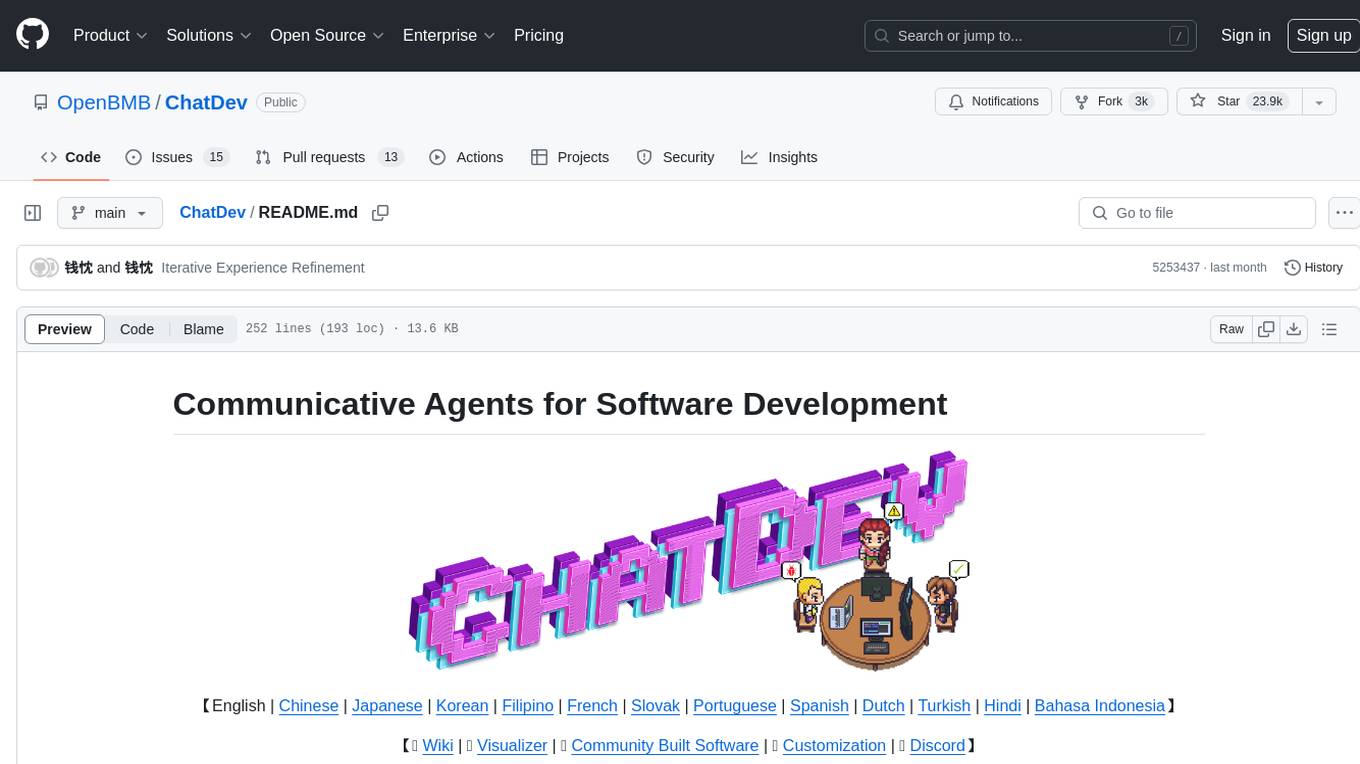
ChatDev
ChatDev is a virtual software company powered by intelligent agents like CEO, CPO, CTO, programmer, reviewer, tester, and art designer. These agents collaborate to revolutionize the digital world through programming. The platform offers an easy-to-use, highly customizable, and extendable framework based on large language models, ideal for studying collective intelligence. ChatDev introduces innovative methods like Iterative Experience Refinement and Experiential Co-Learning to enhance software development efficiency. It supports features like incremental development, Docker integration, Git mode, and Human-Agent-Interaction mode. Users can customize ChatChain, Phase, and Role settings, and share their software creations easily. The project is open-source under the Apache 2.0 License and utilizes data licensed under CC BY-NC 4.0.
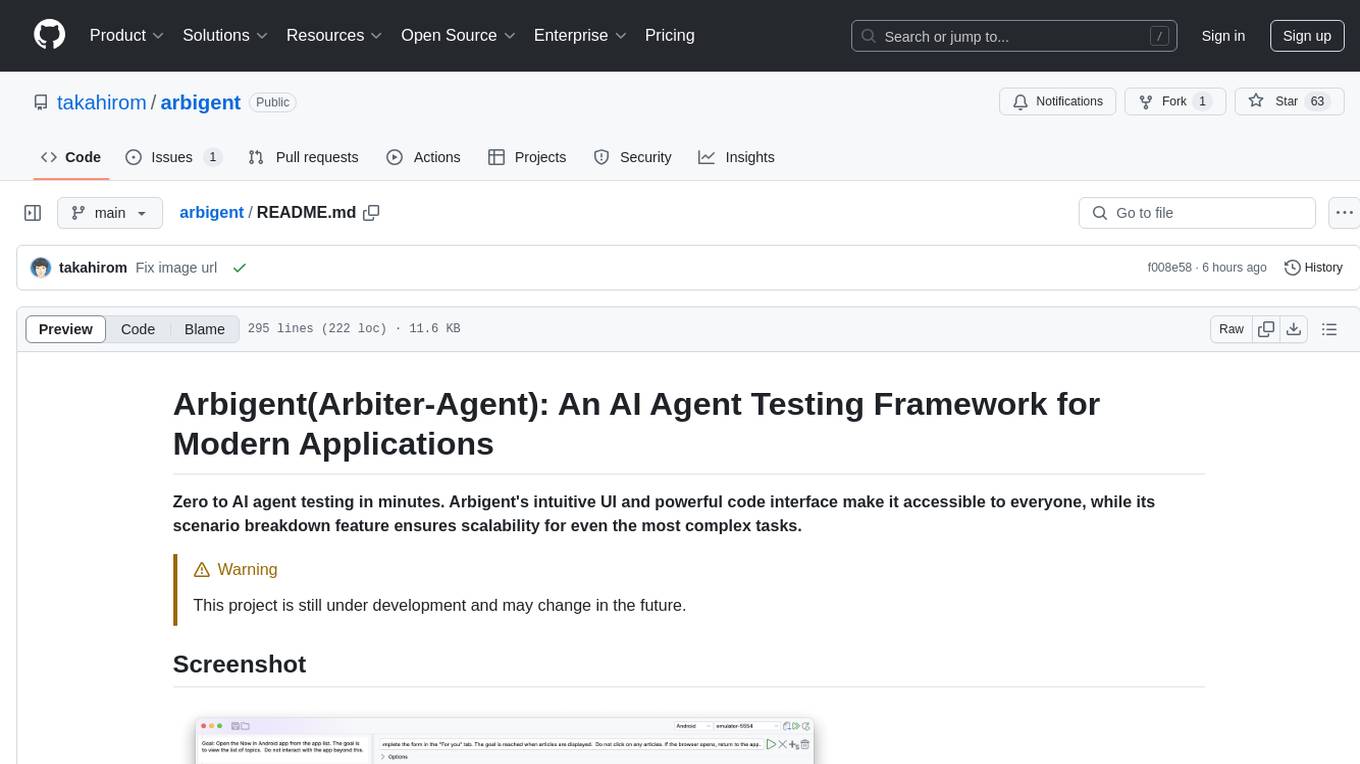
arbigent
Arbigent (Arbiter-Agent) is an AI agent testing framework designed to make AI agent testing practical for modern applications. It addresses challenges faced by traditional UI testing frameworks and AI agents by breaking down complex tasks into smaller, dependent scenarios. The framework is customizable for various AI providers, operating systems, and form factors, empowering users with extensive customization capabilities. Arbigent offers an intuitive UI for scenario creation and a powerful code interface for seamless test execution. It supports multiple form factors, optimizes UI for AI interaction, and is cost-effective by utilizing models like GPT-4o mini. With a flexible code interface and open-source nature, Arbigent aims to revolutionize AI agent testing in modern applications.
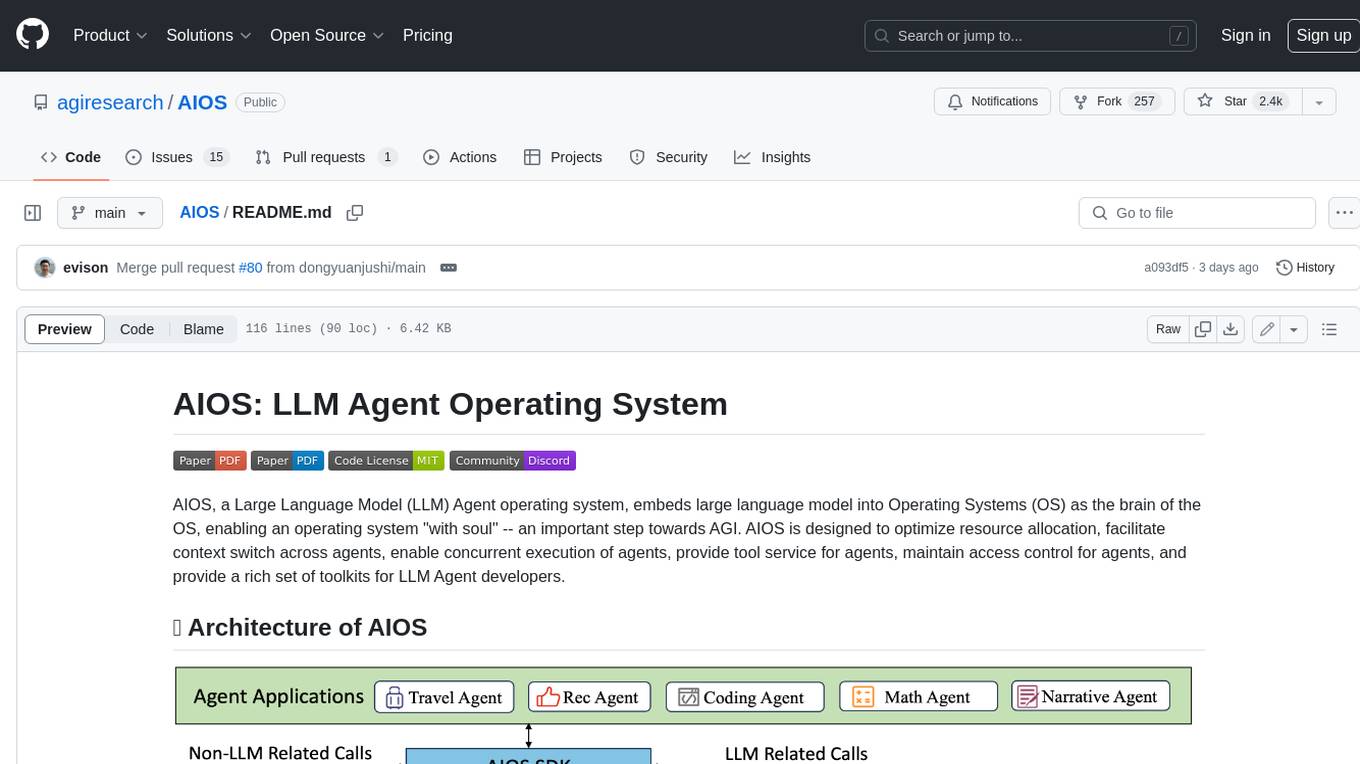
AIOS
AIOS, a Large Language Model (LLM) Agent operating system, embeds large language model into Operating Systems (OS) as the brain of the OS, enabling an operating system "with soul" -- an important step towards AGI. AIOS is designed to optimize resource allocation, facilitate context switch across agents, enable concurrent execution of agents, provide tool service for agents, maintain access control for agents, and provide a rich set of toolkits for LLM Agent developers.
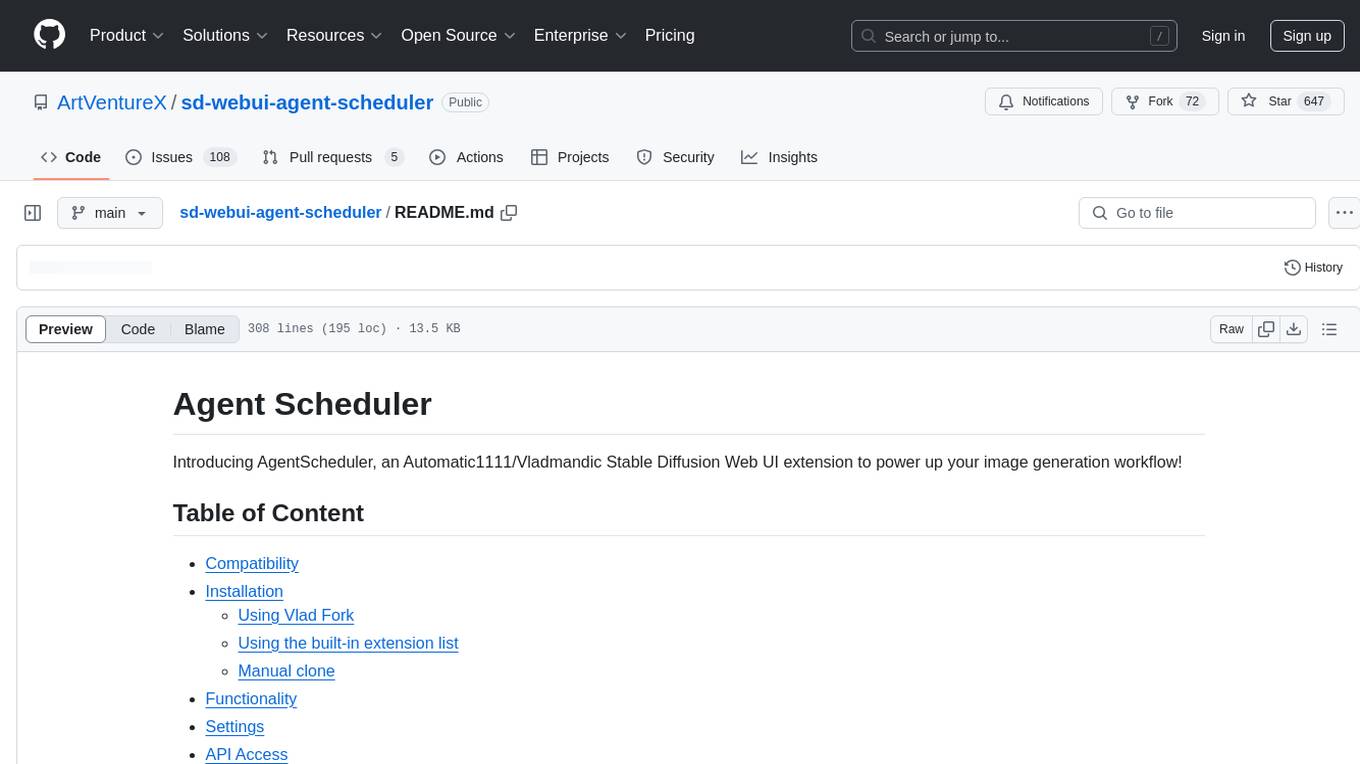
sd-webui-agent-scheduler
AgentScheduler is an Automatic/Vladmandic Stable Diffusion Web UI extension designed to enhance image generation workflows. It allows users to enqueue prompts, settings, and controlnets, manage queued tasks, prioritize, pause, resume, and delete tasks, view generation results, and more. The extension offers hidden features like queuing checkpoints, editing queued tasks, and custom checkpoint selection. Users can access the functionality through HTTP APIs and API callbacks. Troubleshooting steps are provided for common errors. The extension is compatible with latest versions of A1111 and Vladmandic. It is licensed under Apache License 2.0.
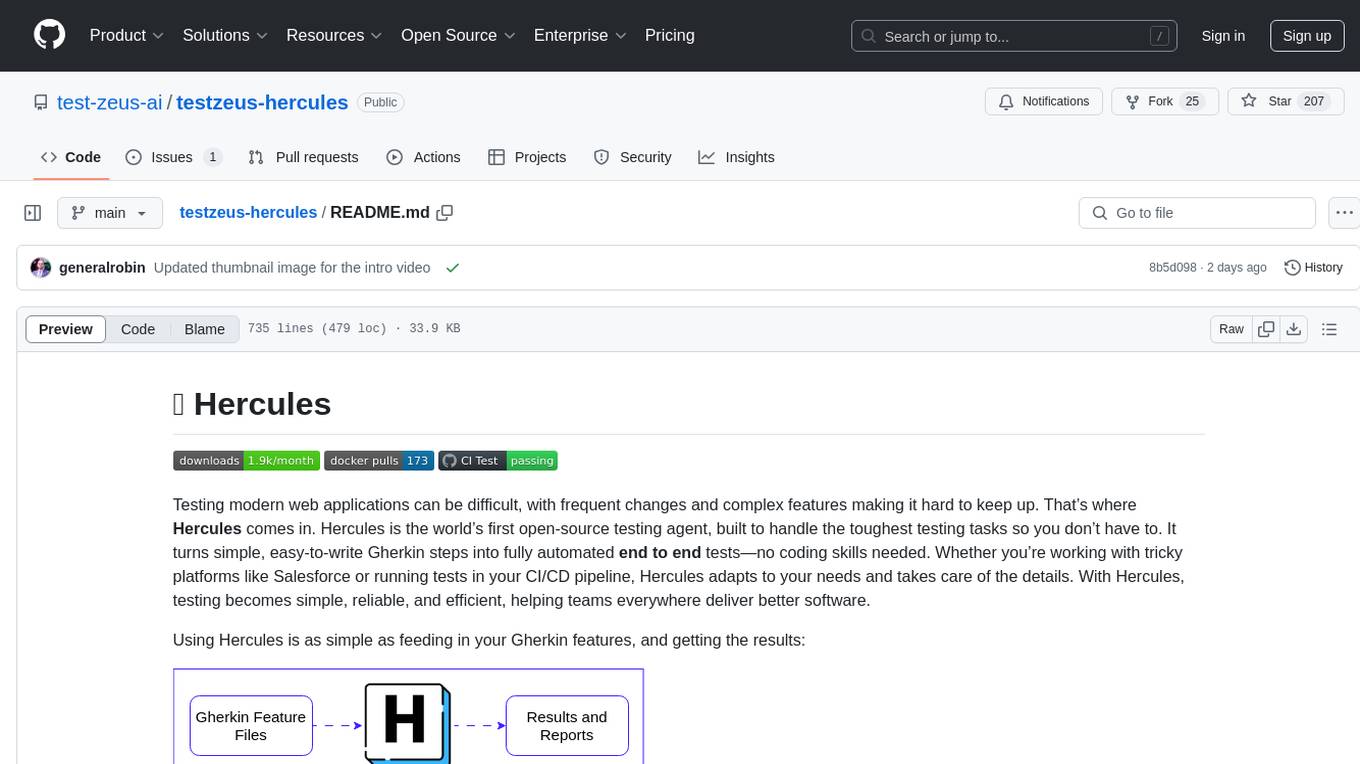
testzeus-hercules
Hercules is the world’s first open-source testing agent designed to handle the toughest testing tasks for modern web applications. It turns simple Gherkin steps into fully automated end-to-end tests, making testing simple, reliable, and efficient. Hercules adapts to various platforms like Salesforce and is suitable for CI/CD pipelines. It aims to democratize and disrupt test automation, making top-tier testing accessible to everyone. The tool is transparent, reliable, and community-driven, empowering teams to deliver better software. Hercules offers multiple ways to get started, including using PyPI package, Docker, or building and running from source code. It supports various AI models, provides detailed installation and usage instructions, and integrates with Nuclei for security testing and WCAG for accessibility testing. The tool is production-ready, open core, and open source, with plans for enhanced LLM support, advanced tooling, improved DOM distillation, community contributions, extensive documentation, and a bounty program.
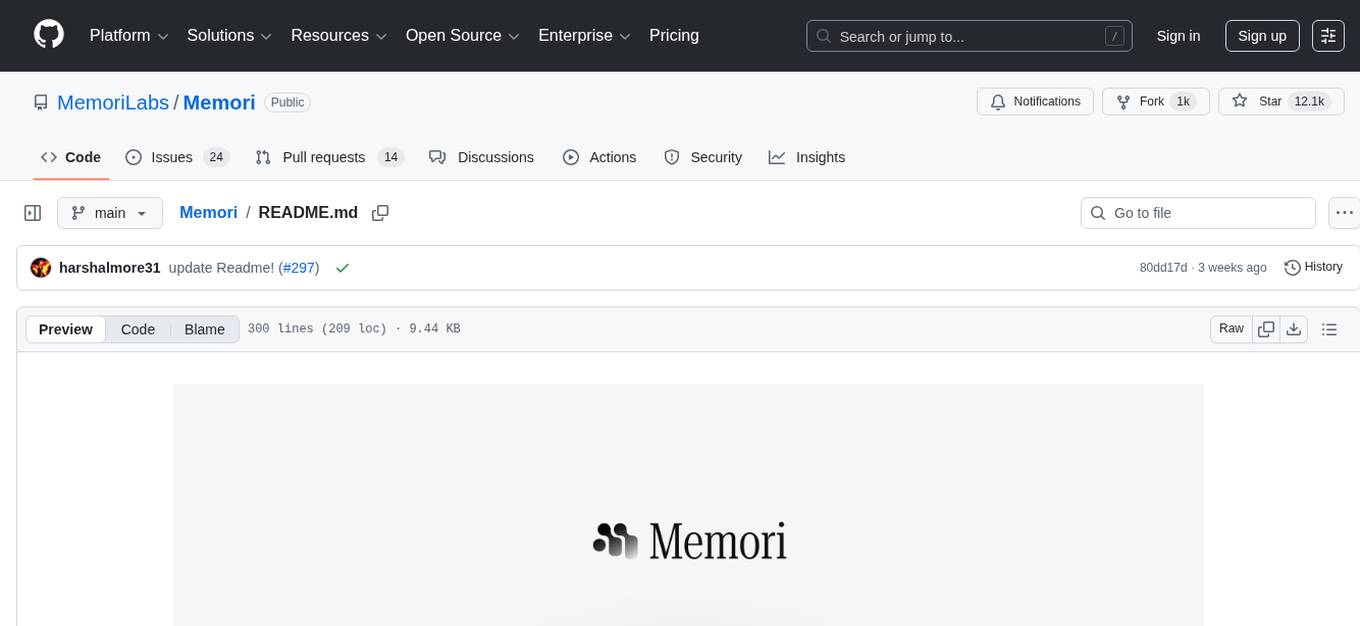
Memori
Memori is a memory fabric designed for enterprise AI that seamlessly integrates into existing software and infrastructure. It is agnostic to LLM, datastore, and framework, providing support for major foundational models and databases. With features like vectorized memories, in-memory semantic search, and a knowledge graph, Memori simplifies the process of attributing LLM interactions and managing sessions. It offers Advanced Augmentation for enhancing memories at different levels and supports various platforms, frameworks, database integrations, and datastores. Memori is designed to reduce development overhead and provide efficient memory management for AI applications.
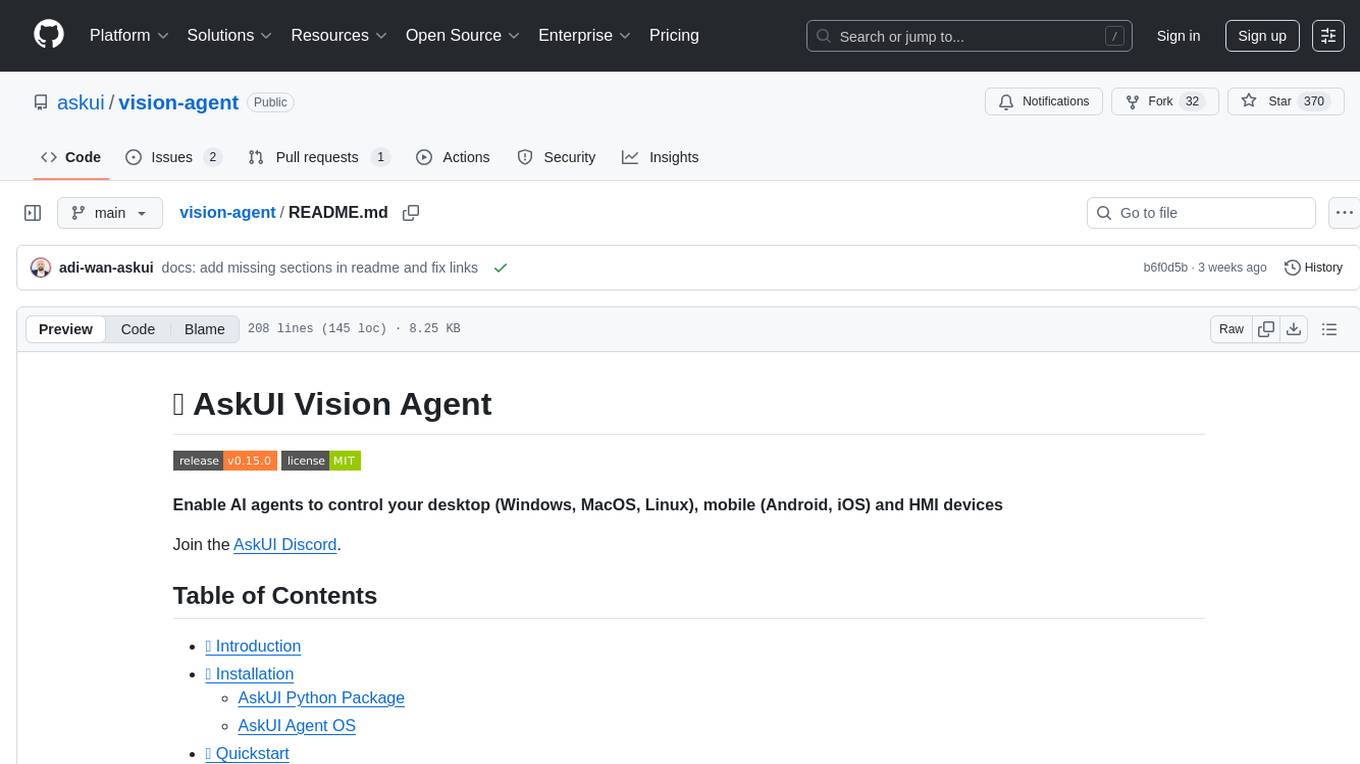
vision-agent
AskUI Vision Agent is a powerful automation framework that enables you and AI agents to control your desktop, mobile, and HMI devices and automate tasks. It supports multiple AI models, multi-platform compatibility, and enterprise-ready features. The tool provides support for Windows, Linux, MacOS, Android, and iOS device automation, single-step UI automation commands, in-background automation on Windows machines, flexible model use, and secure deployment of agents in enterprise environments.

gptme
GPTMe is a tool that allows users to interact with an LLM assistant directly in their terminal in a chat-style interface. The tool provides features for the assistant to run shell commands, execute code, read/write files, and more, making it suitable for various development and terminal-based tasks. It serves as a local alternative to ChatGPT's 'Code Interpreter,' offering flexibility and privacy when using a local model. GPTMe supports code execution, file manipulation, context passing, self-correction, and works with various AI models like GPT-4. It also includes a GitHub Bot for requesting changes and operates entirely in GitHub Actions. In progress features include handling long contexts intelligently, a web UI and API for conversations, web and desktop vision, and a tree-based conversation structure.

opencompass
OpenCompass is a one-stop platform for large model evaluation, aiming to provide a fair, open, and reproducible benchmark for large model evaluation. Its main features include: * Comprehensive support for models and datasets: Pre-support for 20+ HuggingFace and API models, a model evaluation scheme of 70+ datasets with about 400,000 questions, comprehensively evaluating the capabilities of the models in five dimensions. * Efficient distributed evaluation: One line command to implement task division and distributed evaluation, completing the full evaluation of billion-scale models in just a few hours. * Diversified evaluation paradigms: Support for zero-shot, few-shot, and chain-of-thought evaluations, combined with standard or dialogue-type prompt templates, to easily stimulate the maximum performance of various models. * Modular design with high extensibility: Want to add new models or datasets, customize an advanced task division strategy, or even support a new cluster management system? Everything about OpenCompass can be easily expanded! * Experiment management and reporting mechanism: Use config files to fully record each experiment, and support real-time reporting of results.
For similar tasks

UFO
UFO is a UI-focused dual-agent framework to fulfill user requests on Windows OS by seamlessly navigating and operating within individual or spanning multiple applications.
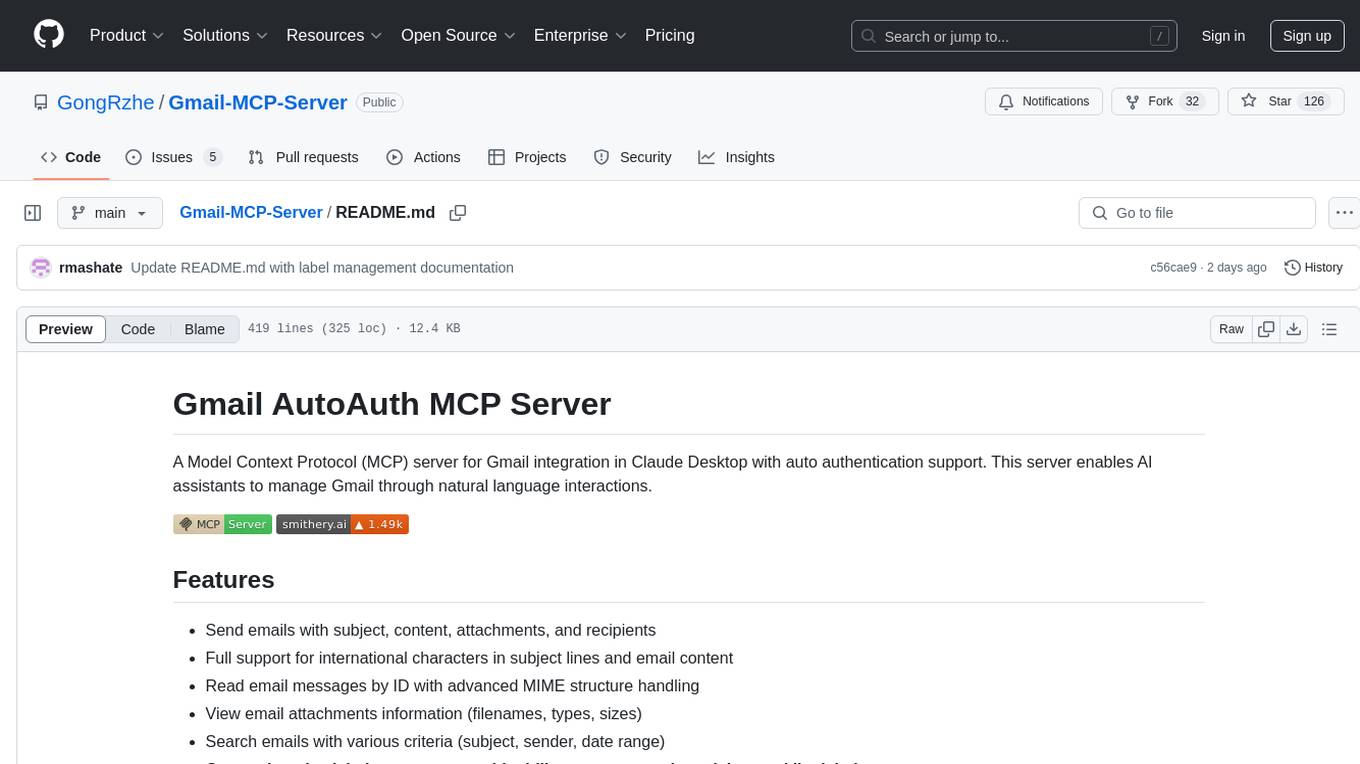
Gmail-MCP-Server
Gmail AutoAuth MCP Server is a Model Context Protocol (MCP) server designed for Gmail integration in Claude Desktop. It supports auto authentication and enables AI assistants to manage Gmail through natural language interactions. The server provides comprehensive features for sending emails, reading messages, managing labels, searching emails, and batch operations. It offers full support for international characters, email attachments, and Gmail API integration. Users can install and authenticate the server via Smithery or manually with Google Cloud Project credentials. The server supports both Desktop and Web application credentials, with global credential storage for convenience. It also includes Docker support and instructions for cloud server authentication.
For similar jobs

ChatFAQ
ChatFAQ is an open-source comprehensive platform for creating a wide variety of chatbots: generic ones, business-trained, or even capable of redirecting requests to human operators. It includes a specialized NLP/NLG engine based on a RAG architecture and customized chat widgets, ensuring a tailored experience for users and avoiding vendor lock-in.

anything-llm
AnythingLLM is a full-stack application that enables you to turn any document, resource, or piece of content into context that any LLM can use as references during chatting. This application allows you to pick and choose which LLM or Vector Database you want to use as well as supporting multi-user management and permissions.

chatbot-ui
Chatbot UI is an open-source AI chat app that allows users to create and deploy their own AI chatbots. It is easy to use and can be customized to fit any need. Chatbot UI is perfect for businesses, developers, and anyone who wants to create a chatbot.
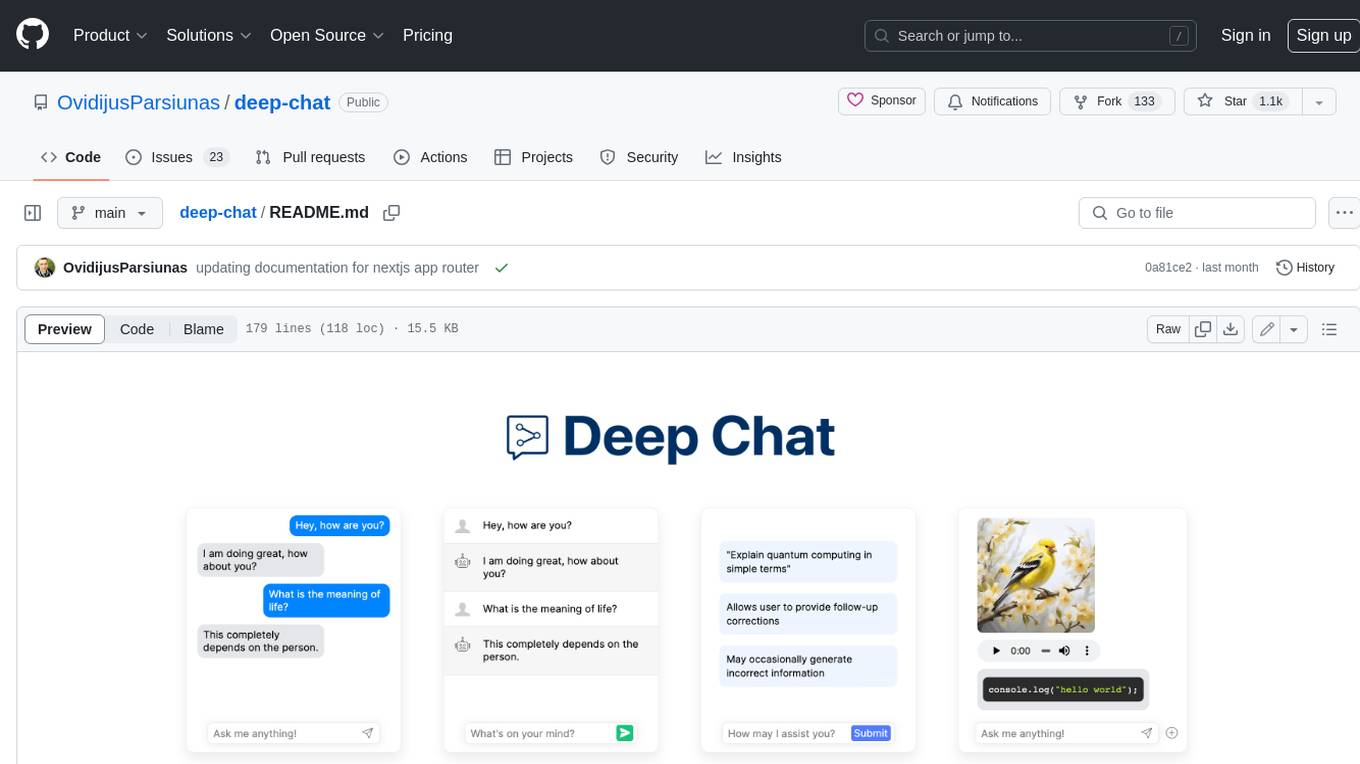
deep-chat
Deep Chat is a fully customizable AI chat component that can be injected into your website with minimal to no effort. Whether you want to create a chatbot that leverages popular APIs such as ChatGPT or connect to your own custom service, this component can do it all! Explore deepchat.dev to view all of the available features, how to use them, examples and more!

Avalonia-Assistant
Avalonia-Assistant is an open-source desktop intelligent assistant that aims to provide a user-friendly interactive experience based on the Avalonia UI framework and the integration of Semantic Kernel with OpenAI or other large LLM models. By utilizing Avalonia-Assistant, you can perform various desktop operations through text or voice commands, enhancing your productivity and daily office experience.
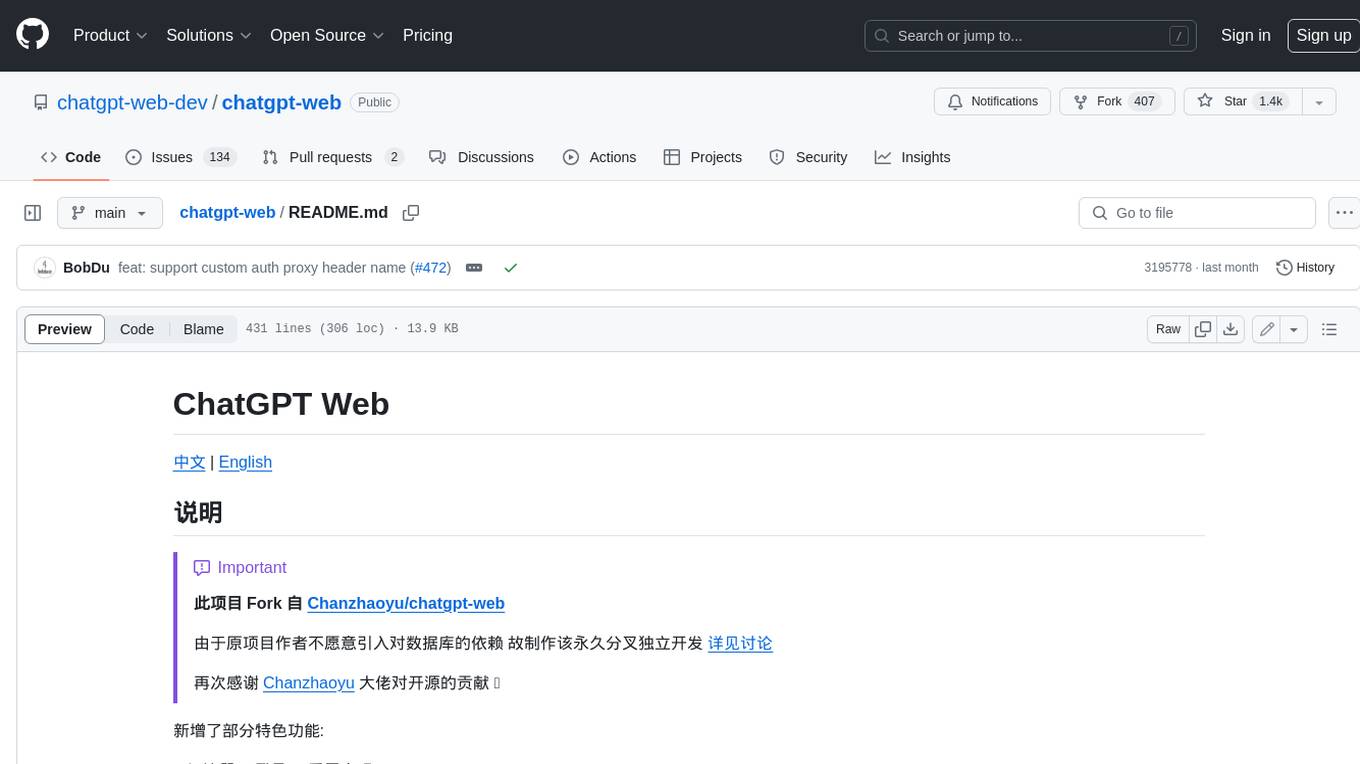
chatgpt-web
ChatGPT Web is a web application that provides access to the ChatGPT API. It offers two non-official methods to interact with ChatGPT: through the ChatGPTAPI (using the `gpt-3.5-turbo-0301` model) or through the ChatGPTUnofficialProxyAPI (using a web access token). The ChatGPTAPI method is more reliable but requires an OpenAI API key, while the ChatGPTUnofficialProxyAPI method is free but less reliable. The application includes features such as user registration and login, synchronization of conversation history, customization of API keys and sensitive words, and management of users and keys. It also provides a user interface for interacting with ChatGPT and supports multiple languages and themes.
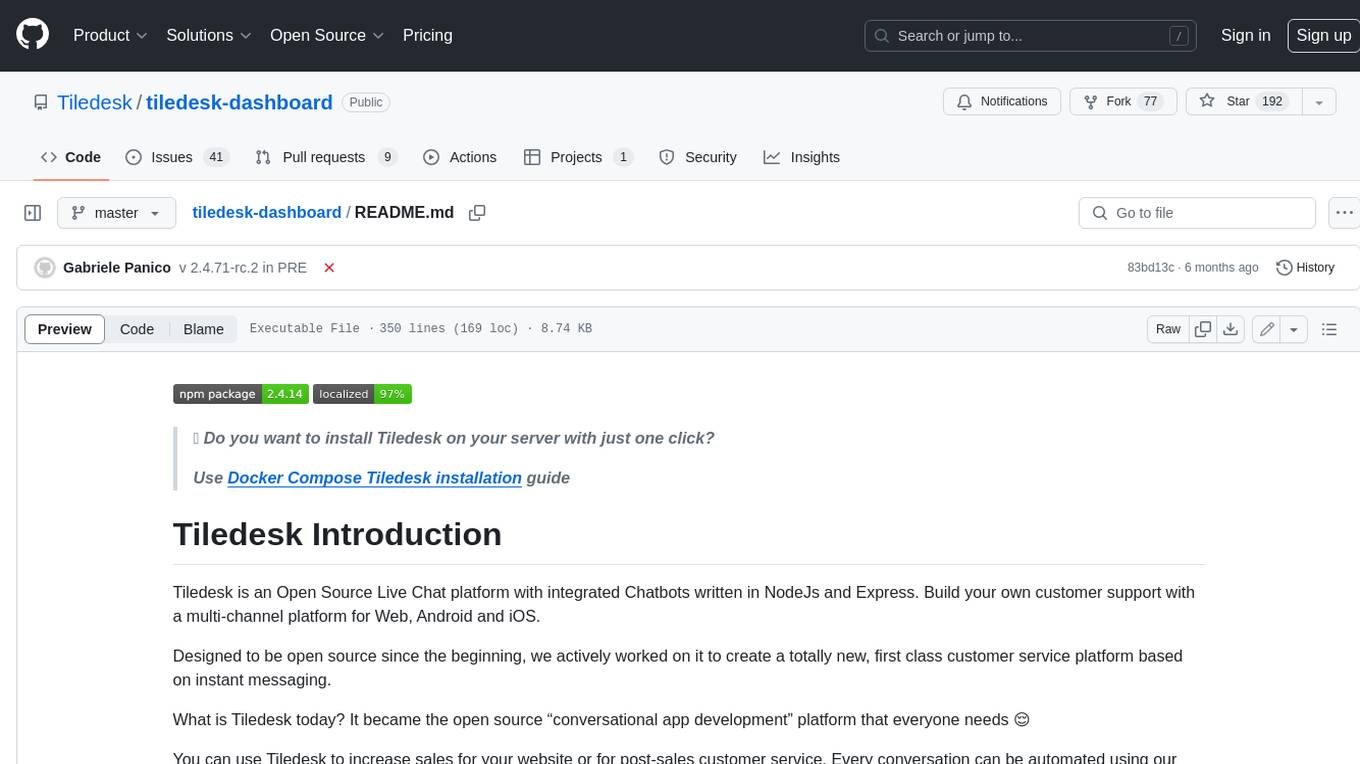
tiledesk-dashboard
Tiledesk is an open-source live chat platform with integrated chatbots written in Node.js and Express. It is designed to be a multi-channel platform for web, Android, and iOS, and it can be used to increase sales or provide post-sales customer service. Tiledesk's chatbot technology allows for automation of conversations, and it also provides APIs and webhooks for connecting external applications. Additionally, it offers a marketplace for apps and features such as CRM, ticketing, and data export.

UFO
UFO is a UI-focused dual-agent framework to fulfill user requests on Windows OS by seamlessly navigating and operating within individual or spanning multiple applications.






